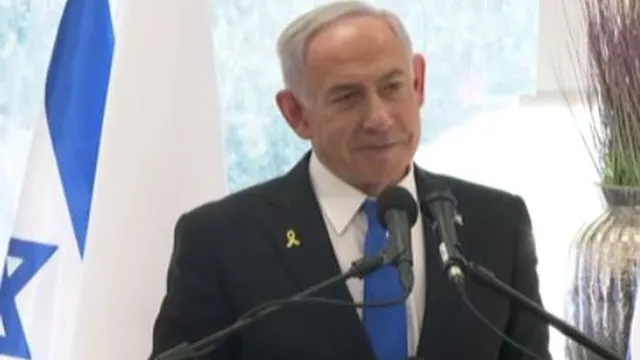
Netanyahu claims new opportunities to secure hostage release from Gaza
2025-06-30 10:42- Following military operations with Iran, Netanyahu sees potential to secure the release of hostages held in Gaza.
- Many victims have been reported in ongoing airstrikes in Gaza, escalating concerns about civilian casualties.
- Netanyahu's shift in priority raises hopes for families of hostages while calling for an urgent diplomatic resolution.
Express your sentiment!
Insights
In Israel, Prime Minister Benjamin Netanyahu announced that following a recent military conflict with Iran, many opportunities have arisen for freeing hostages held by Hamas militants in Gaza. His statements, made during a visit to a Shin Bet security facility, marked a notable shift in his focus from the defeat of Hamas to the urgent need to secure the return of the hostages. Netanyahu's comments followed a heavy aerial bombardment of Gaza, which resulted in significant civilian casualties, and received pressure from domestic families of hostages and international leaders calling for a ceasefire. Amid ongoing violence, there is growing concern for the fates of approximately 50 hostages, with over 20 confirmed alive. The background includes ongoing negotiations for a ceasefire, spurred by U.S. President Donald Trump's direct calls for a deal to secure both a truce and the hostages' return. As military operations in Gaza intensify, the humanitarian situation worsens, with casualties reported rising daily. Families of hostages expressed their frustrations, stating that the focus should be on their release rather than merely military objectives. The developments indicate rising pressures on Netanyahu’s government to find a diplomatic resolution in addition to the military strategies currently employed, amid hopes from various parties for renewed dialogue in the region and a halt to ongoing hostilities.
Contexts
Israeli Prime Minister Benjamin Netanyahu has made notable statements regarding the situation of hostages in Gaza amidst ongoing conflict and military operations. Over the years, the issue of hostages held by militant groups in Gaza has remained a pressing humanitarian concern. Netanyahu’s public comments illustrate the complexities and nuances involved in negotiations for the release of hostages, particularly in a volatile security environment that is often characterized by hostility and mistrust between Israel and Gaza-based militant organizations, principally Hamas. The Israeli government has been adamant about not sacrificing national security for the sake of hostages, asserting that any negotiations must be conducted from a position of strength. Netanyahu has emphasized Israel’s commitment to ensuring the safe return of hostages, underscoring the emotional and social implications for families involved. He has articulated the Israeli government's strategy, which involves a multifaceted approach to hostage negotiations that balances military actions against terrorist infrastructure and diplomatic efforts to secure their release. The Prime Minister often highlights the role of the Israeli Defense Forces (IDF) in both operational military engagements and intelligence-gathering endeavors, which are crucial for understanding the whereabouts of hostages and the intentions of captors. This dual strategy aims to apply pressure on Hamas while also providing avenues for negotiations when deemed possible. In addition to operational strategies, Netanyahu’s statements reflect an awareness of the broader international community’s interest in humane treatment and the safe return of hostages. He has appealed for global support, advocating for international condemnation of terrorist activities that target civilians and take hostages. By presenting the plight of hostages within the framework of human rights, Netanyahu seeks to galvanize external diplomatic efforts and support, which could potentially lead to breakthroughs in negotiations. The reports of ongoing talks, often secretive and fraught with challenges, highlight the precarious balance Israel must maintain between military objectives and humanitarian concerns. As events unfold, the dynamics surrounding hostage situations remain fluid. Netanyahu’s leadership, marked by steadfast determination, has drawn both national and international scrutiny. Observers note that while the rhetoric surrounding hostage negotiations may resonate with domestic audiences, the effectiveness of these strategies ultimately hinges on tangible outcomes. The challenges of addressing conflicting interests, maintaining public morale, and securing the lives of hostages will continue to define Netanyahu’s approach to this deeply complex issue. As the situation in Gaza remains uncertain, the calls for action and dialogue will persist, putting pressure on all stakeholders involved to navigate the delicate framework of hostage diplomacy.